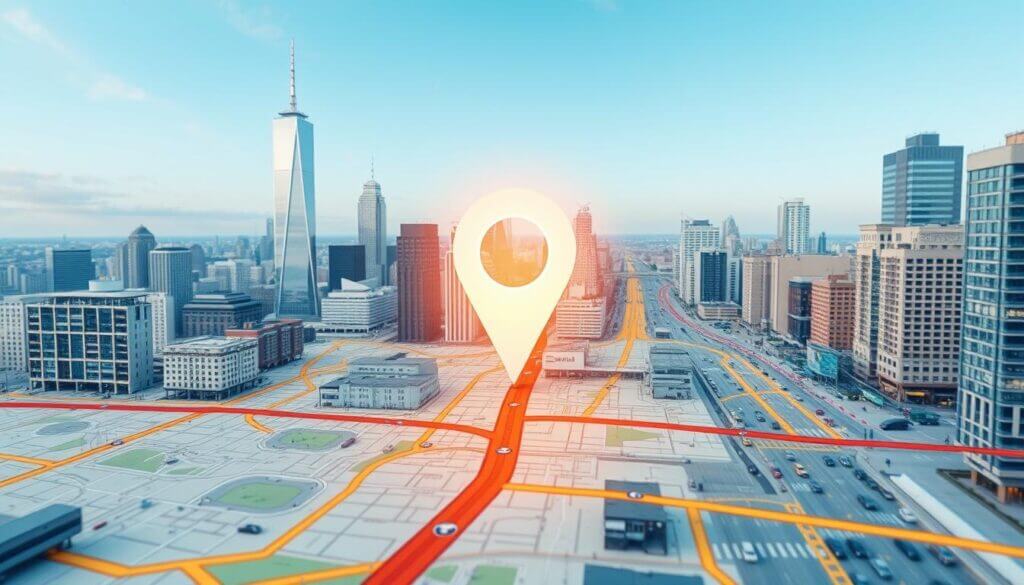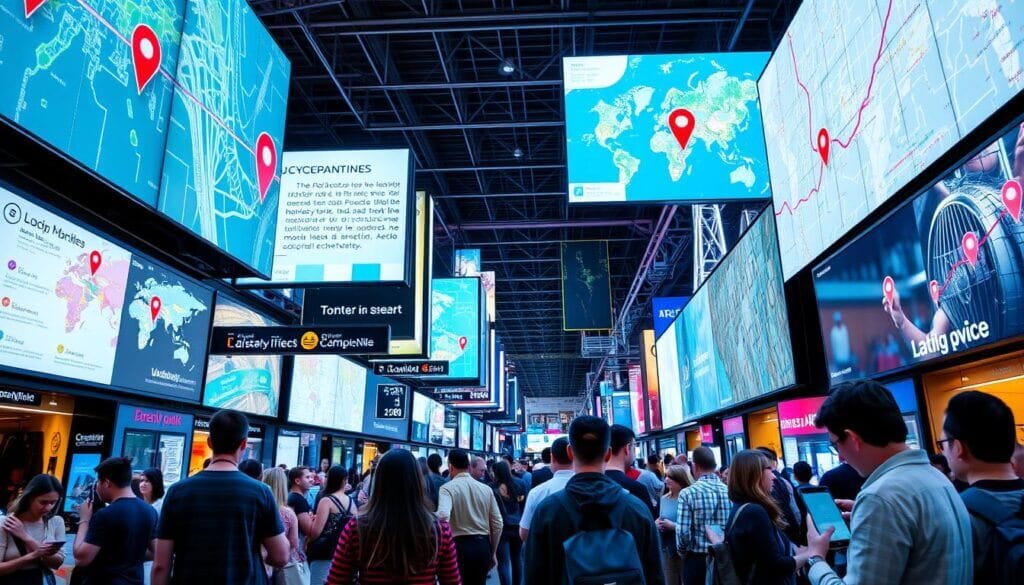In today’s world, finding a business online is key. People use their phones and the internet to look for services and products. So, knowing exactly where your business is matters a lot for its success Growth with local seo.
Google aims to make all information easy to find and use. This means location data is super important. It helps show the best search results and directions. It makes using the internet better.
Having the right location info makes it easier for customers to find you. It also helps make the digital world work better. Websites, online accounts, and apps use location data a lot. They need it to use the right language and to keep accounts safe.
Key Takeaways
- To boost your business’s visibility on digital maps and search results, accurate location data is key.
- Accurate location info helps create a better user experience. It lets customers find and interact with your business more easily.
- Location data is vital to core Google services. It powers driving directions and relevant search results.
- Leveraging location data can enhance security and personalization, further improving the customer experience.
- In today’s digital age, accurate location data is vital for your business. It is key to your success.
Introduction: The Importance of Location Accuracy in the Digital Age
In today’s world, getting location info right is key. Businesses and customers use online tools a lot. They need accurate location info for search results and finding their way.
The Role of Location Information in Google’s Services
Google’s services like Search, Maps, and Google My Business need location data to work well. This info makes sure you get the right language and keeps Google safe. Google uses this data to improve search results, traffic info, and suggestions based on your location.
How Location Precision Enhances Customer Experience
Getting locations right makes customers happier by giving them what they need. For instance, if you’re looking for movie times, you want them for your area, not somewhere else. Google Maps uses this info to help you find places and get around.

Understanding Location Tracking and Data Collection
Today, location tracking is key for businesses. It helps them improve their services and meet users’ needs. As we use more apps and digital maps, we must understand location tracking and data collection.
Methods of Location Tracking by Devices and Apps
Android devices can find your location using GPS, sensors, mobile networks, and Wi-Fi. Google Location Accuracy (GLA) uses these signals to improve your device’s location. When on, GLA collects location info from your device with a unique ID.
A map app requires tracking your location for better directions. The app needs to know where you are to guide you right. Your phone and the app use GPS and other tech to figure out where you are.

Justification for Initial Location Data Collection
Apps and services collect location data to offer better services and tailored experiences. For instance, a navigation app needs your location for correct directions. A weather app uses your location for forecasts. Users agree to this during app setup or in settings.
Knowing how location tracking works and why data is collected helps businesses. They can make sure they’re offering value and respecting users’ privacy.
The Secondary Location Data Market and Its Implications
In today’s digital world, location data is very valuable. It started as a way to help users, but now, it’s used in a new market. This market sells location data for different purposes. It affects both businesses and consumers.
This market buys and uses location data from phones, apps, and devices. It creates detailed profiles of people. This lets marketers send targeted ads and offers. The use of location data has grown a lot, helping businesses stay ahead.
| Statistic | Value |
|---|---|
| More than a billion people use Google Maps every month | 1 billion+ |
| Over 5 million active apps and websites utilize Google Maps Platform core products weekly | 5 million+ |
| Google Maps users contribute greater than 20 million pieces of information daily | 20 million+ |
The secondary location data market has big effects. It helps businesses profit from location data monetization and analytics. But, it also makes people worry about privacy and data safety. Users need to know how their location data is used and control it to trust digital services.
As the secondary location data market grows, businesses must find a balance. They need to be innovative but protect privacy too. By using location data wisely, businesses can grow while keeping their customers’ trust.

Monetization of Location Data in the Secondary Market
The digital ad world has changed a lot lately, with location data becoming key. In 2021, digital ads grew by 35%, hitting nearly $190 billion. Search ads made up 41% of this, and display ads made up 30%. Big names like Google made a huge impact, with $78.3 billion from search and $56.7 billion from display ads.
Business Use Cases for Identified and Aggregated Location Data
Companies use location data with other customer info to understand what people want. This helps them target ads better, especially in retail and other sectors. Location data is now a big deal in the growing market for consumer data, expected to hit $350 million by 2020.
The Scale and Scope of Location Data Analytics
Location analytics firms track millions of shoppers yearly from thousands of stores. A single visit can create over 10,000 data points, not counting sales info. This lets companies make detailed profiles of people based on where they go and what they do. It’s a strong tool for reaching the right audience.
The way digital ads work is changing, making location data key for business. Using location data insights helps companies improve their ads and marketing. This leads to better customer experiences and more profits.
Location accuracy, Digital map optimization, Google Maps business update
In today’s digital world, having the right location info is key for businesses. It helps them get found on digital maps and gives customers a smooth experience. Improve your Google My Business listing and use location data for SEO. This will increase your brand’s visibility. This draws in more customers in your area.
Google Maps lets businesses show their location, hours, and contact info to potential customers. About 86% of people use Google Maps to find local businesses. Claiming and verifying your Google My Business listing lets you control your online presence. This ensures your business info is correct and fresh.
Google My Business has more to offer than just the basics. You can add up to 9 categories to your listing, with the main one standing out. You can also share when you opened, which won’t appear until 90 days before that date. This tells customers how long your business has been around.
| Feature | Description |
|---|---|
| Multiple Categories | Up to 9 categories can be selected for a business on Google Business Profile, with the category in the first field becoming the primary category. |
| Opening Date | An opening date can be added to a Business Profile, and it won’t show on Google until 90 days before the date, providing information on how long the business has been in operation. |
| Hotel Amenities | Only owners with verified hotel profiles can edit services and amenities in the “Hotel attributes” section in Business Profile Manager, applicable to hotels only. |
| Inventory Display | For car dealerships, a new feature pilot allows the display of available sales inventory on dealership Business Profiles. Customers can search, filter, and get details about cars for sale. |
Using location data for SEO can also boost your business’s visibility. A recent study found that 88% of customers read online reviews before buying. To be found by local customers, optimize your site for local searches. Get backlinks and add a local map.
Mastering location accuracy and map optimization will make your business stand out on Google Maps. It draws in more customers in your area. Stay ahead by using the latest features and strategies to boost your online presence and grow sustainably.
Ensuring Your Business is Easily Found on Digital Maps
In today’s digital world, a strong online presence is key for businesses to attract local customers. Using Google My Business listings and local SEO strategies is a great way to do this.
Optimizing Your Google My Business Listing
Google My Business is a free tool. It helps businesses manage their online presence on Google, including Search and Maps. Make sure your business info is correct and current to help customers find you.
- Check your business address and hours. This gives customers accurate info.
- Add high-quality photos and videos. They will showcase your business and attract more attention in search results.
- Reply to all reviews to build trust. It shows your commitment to customer service.
- Use features like appointment booking, online ordering, and accessibility info. They will enhance your listing and attract a wider audience.
Leveraging Location Data for Local SEO
Adding location data to your SEO strategy can boost your visibility in local searches and on digital maps. Use location-specific keywords on your site and content. This helps customers find your business.
| Strategy | Benefits |
|---|---|
| Optimizing website content with local keywords | Improves visibility in location-based searches |
| Creating location-based content | Establishes your business as a local authority |
| Leveraging location data for targeted advertising | Reaches potential customers in your immediate area |
Optimize your Google My Business listing and use location data in your SEO. This will ensure your business is easy to find on maps and in searches. This will help bring in more customers and online engagement.
The Role of Precise Location Data in Autonomous Vehicles and Advanced Driver Assistance Systems (ADAS)
The future of transportation is moving towards autonomous vehicles. They and advanced driver assistance systems (ADAS) need accurate maps to navigate safely. Dynamic Map Platform leads in this area. It has high-definition 3D mapping tech.
Dynamic Map Platform: A Leader in High-Definition 3D Mapping
Dynamic Map Platform covers over 35,000 km in Japan, 550,000 miles in the US, and 120,000 miles in Europe. Its maps are so accurate, they measure down to single-digit centimeters. This level of detail is crucial for self-driving cars to work well.
They use Dynamic Map Platform’s maps with complex algorithms and wireless connectivity. This helps make self-driving cars safer and more efficient. As we move towards full self-driving, we’ll need reliable data from many sources.
Experts say it’s vital to keep map errors low for self-driving cars. They need to have backup plans for when technology fails. Combining advanced technologies is key to making self-driving cars safer and greener.
| Feature | Description |
|---|---|
| Data Coverage | 35,000 km in Japan, 550,000 miles in the US, 120,000 miles in Europe |
| Accuracy | Single-digit centimeter precision |
| Key Capabilities | Virtual lane markers, geofencing, and other advanced features for autonomous driving |
Precise location data is crucial for self-driving cars and ADAS. Companies like Dynamic Map Platform are leaders in making the maps needed for safe self-driving.
Location Data Privacy Concerns and Regulations
Location tracking technologies are everywhere, making us worry about privacy. The use of location data has both good and bad sides. In the US, laws protect some location data, but not all. They don’t cover the use of data that’s not linked to a person’s name.
The Tension Between Privacy and Innovation
With the rise of location data privacy, privacy laws, and surveillance capitalism, we face a big challenge. We need to weigh the benefits of location services against protecting our privacy. These technologies offer new solutions. But, they worry us. Our location info could be misused.
- Current US laws provide limited protection, primarily focused on identified location data.
- The secondary market practices of using de-identified data to profile individuals are not sufficiently addressed by existing regulations.
- Businesses must navigate the delicate balance between leveraging location data for growth and respecting the privacy rights of their customers.
| Key Privacy Concerns | Potential Benefits of Location Data |
|---|---|
| Comprehensive individual profiling and surveillance | Improved customer experience and targeted services |
| Lack of transparency and control over data usage | Innovations in transportation, logistics, and sustainability |
| Risks of de-identified data being re-identified | Enhanced location-based marketing and advertising |
The debate on location data privacy is ongoing. We need to work together to make sure we keep innovating but also protect our privacy and data.
Green Innovations Leveraging Location Data
Location data is key to a greener future. It helps in making green innovations possible. For example, Dynamic Map Platform’s 3D mapping data optimizes truck routes. This cuts fuel costs and CO2 emissions.
In countries like Japan, trucks are a big source of CO2 emissions. By using detailed location data, logistics companies can find the best delivery routes. This reduces fuel use and lowers CO2 emissions.
Location data helps find the best places for EV charging along delivery routes. This supports the move to cleaner transport.
Green projects use location data. It shows how tech can solve big environmental issues. As we focus more on being green, location-based data will be key. It will help reduce CO2 emissions and make tomorrow greener.
The Future of Location Precision and Its Impact on Businesses
The digital world is changing fast, making location precision more important for businesses. New tech in tracking and analyzing locations is changing the game. This change will greatly affect businesses in many fields.
Location-based services will see a big change thanks to this. Companies that use location data well will stand out. They can better target ads, offer personalized deals, plan routes, and manage stock.
This will greatly improve how businesses serve their customers and run their operations.
Location data will also change the car industry. It will make driving safer and more efficient. Cars will know exactly where they are and can plan the best routes. This means less traffic, less pollution, and happier drivers.
But, as we use more location data, privacy becomes a big concern. Companies and governments must find a way to use this data without invading privacy. They need to be open with customers and follow strict rules to protect privacy.
In the end, the future of location precision is very promising for businesses. It offers new ways to improve customer experiences and grow sustainably. Tech-savvy, privacy-respecting firms can thrive in the digital world.
Conclusion
The digital world is always changing. So, businesses must be precise with their location. Improving their rank on digital maps, like Google Maps, can help. Using location data for local SEO can boost visibility to customers. This is very important as searches for “near me” or “where to buy” have gone up by over 200%.
Companies that keep their Google My Business listings up to date, answer reviews, and update their info often see big wins. They see a 36% rise in searches for directions. Users are 2.7 times more likely to view them positively. Their website gets 23% more clicks. Also, good photos can lead to a 42% increase in directions requests and a 35% boost in website clicks.
But, it’s important to use location data wisely, balancing privacy with innovation. By tracking new rules and customer interests, businesses can use location data to improve online customer experiences and stay ahead.
FAQ
What is the role of location information in Google’s services?
Location info is key to Google’s goal of organizing the world’s info. It makes experiences better, helps people remember places, and finds things faster. It also shows more relevant ads and boosts security.
How does location precision enhance customer experience?
Precise location info makes services more relevant and personal. For example, it shows movie times at nearby theaters, not in another city. Google Maps uses this info to help people find and navigate to places they want to visit.
How do devices and apps track location?
Android devices use GPS, sensors, mobile networks, and Wi-Fi to estimate location. Apps need to know where you are to give you directions to where you want to go.
What is the purpose of initial location data collection?
The first step in collecting location data is to offer a service to the user. The data is then used in the secondary market to make predictions about the user for other purposes.
How is location data used in the secondary market?
The secondary market uses location data for other purposes. For example, it creates marketing profiles. This data helps in targeted advertising and retail strategies.
Why is maintaining accurate and up-to-date location information crucial for businesses?
Accurate location info is key for businesses to be found online and give a smooth experience. It’s important to keep Google My Business listings updated and use location data for SEO.
How can businesses optimize their location data for better visibility?
Businesses should update their Google My Business listing with correct info. Add photos, business hours, and respond to reviews. Using location data for SEO can also improve visibility on maps and in searches.
How is precise location data used in autonomous vehicles and ADAS?
High-definition 3D mapping technology provides precise location data for safe autonomous driving. It enables features like virtual lane markers and geofencing.
What are the privacy concerns around location data?
The growth of location tracking and the resale of location data raises privacy concerns. Location services have benefits, but they also risk profiling and surveillance.
How can location data be leveraged for environmental sustainability?
Location data can help with green innovations. It can find the best routes for truck deliveries to cut fuel costs and emissions. It also helps place EV charging stations in the best spots.

